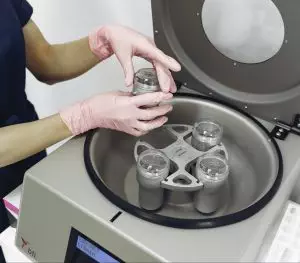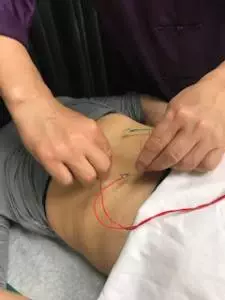-
 Art of Wellness Acupuncture & Traditional Chinese Medicine (TCM)11704 Wilshire Blvd, Suite 295, Los Angeles, CA, 90025
Art of Wellness Acupuncture & Traditional Chinese Medicine (TCM)11704 Wilshire Blvd, Suite 295, Los Angeles, CA, 90025
myartofwellness@gmail.com310-451-5522 Office Hours
MonClosedTue7:30 am --4 pmWed7:30 am --4 pmThu7:30 am -- 4 pmFri7:30 am -- 4 pmSat7:30 am -- 4 pmSunClosedOur office opens from Tuesdays to Saturdays 7:30 am to 4 pm, will be closed on Memorial day, Independent day, Labor day, Thanksgiving day, Christmas and New year.
-
Recent Posts
- Acupuncture for Sciatica Pain
- Can Acupuncture Help With Bladder Control?
- How to Treat De Quervain’s Tenosynovitis With Acupuncture and TCM
- Chinese New Year 2026: Year of the Horse
- Acupuncture and TCM Treatment for Perimenopause Symptoms
- How to Treat Insulin Resistance With Acupuncture and TCM
- How to Treat Metabolic Syndrome With Acupuncture and TCM
- How to Treat Syncope With Acupuncture and TCM
- How to Treat Thoracic Outlet Syndrome With Acupuncture and TCM
- How to Treat Dupuytren’s Contracture With Acupuncture and TCM
- How to Treat Nutcracker Syndrome With Acupuncture and TCM
- How to Treat Rosacea With Acupuncture and TCM
- How to Treat Perioral Dermatitis With Acupuncture and TCM
- Lymphatic Drainage With Acupuncture and TCM
- How to Treat Turf Toe With Acupuncture
- How to Treat Nerve Pain With Acupuncture and TCM
- Sign up to receive news and updates and get my free report:“The Top 10 Reasons to Try Acupuncture”

February 2026 M T W T F S S 1 2 3 4 5 6 7 8 9 10 11 12 13 14 15 16 17 18 19 20 21 22 23 24 25 26 27 28
Immune System
How to Treat Chronic Fatigue Syndrome With Acupuncture and TCM
By Xiaomei Cai, L.Ac., Ph.D. & Qineng Tan, L.Ac., Ph.D.
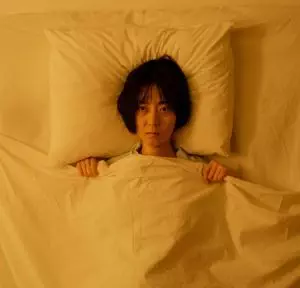
Chronic fatigue syndrome (CFS), also known as myalgic encephalitis (ME/CFS), is a condition marked by extreme fatigue that doesn’t get better, even with rest, and gets worse with physical and mental exertion. Chronic fatigue is not well understood by medical science, but acupuncture and Chinese medicine for chronic fatigue syndrome symptoms can be an effective treatment option.
People with chronic fatigue syndrome are always tired, even after getting a normal amount of sleep, and the condition persists for weeks, months, or years. Other chronic fatigue symptoms include body aches, cognitive problems, vision problems, and emotional or mental health problems, like depression and anxiety.
If a person feels tired all the time, with no medical explanation, for six months or more, and has several other chronic fatigue syndrome symptoms like dizziness, difficulty concentrating, headaches, or sensitivity to light, then they might be diagnosed with CFS, or myalgic encephalitis (ME CFS).
By definition, a syndrome is a collection of symptoms that often appear together in combination, for which the exact explanation is unknown. Chronic fatigue has been considered a syndrome for some time, but has more recently been given the designation of a “disease;” hence, the newer term “myalgic encephalitis,” which refers to muscle pain and inflammation of the brain and spinal cord.
Chronic fatigue syndrome symptoms can be very similar to those of fibromyalgia. People with fibromyalgia also experience severe fatigue, but the primary symptoms of fibromyalgia are musculoskeletal pain that comes and goes all over, especially in “tender points” around the major muscles and joints, along with swelling and inflammation. It is possible to have both ME/CFS and fibromyalgia.
Women are much more likely to have chronic fatigue than men. MECFS can begin to appear at any stage of life, but most usually develops in adulthood. It is estimated that up to 90% of people who have chronic fatigue go undiagnosed.
ME/CFS is a serious and disabling condition that can interfere with even the most basic daily activities. People with chronic fatigue may be able to participate in some events where they exert themselves mentally and/or physically, but afterwards, they will feel completely wiped out and have to take time to recover, often confined to bed. This is called post-exertional malaise (PEM).
Top 10 Chronic Fatigue Syndrome Symptoms

The most common ME/CFS symptoms include:
- Fatigue, tired all the time, weakness
- Sensitivity to light
- Trouble concentrating, hard to focus, memory problems, confusion
- Dizziness, especially when getting up from lying down
- Headaches
- Muscle aches, body ache, muscle weakness, joint pain
- Enlarged lymph nodes in neck or armpit area, sore throat
- Tired after exercise or mental exertion (post-exertional malaise)
- Depression, mood swings, moodiness
- Insomnia, sleep problems
Other signs of chronic fatigue syndrome may include: fever, abdominal pain, weight loss or weight gain, allergies, rash, rapid heart beat, and night sweats/hot flashes.
What Causes Chronic Fatigue?
The cause of ME/CFS is not known. Immune system dysfunction, the aftereffects of having a virus, and psychological factors have all been associated with the development of chronic fatigue.
Some people begin to have symptoms of chronic fatigue after having a viral infection, such as Epstein Barr, mononucleosis, or herpes. Postural orthostatic tachycardia syndrome (POTS) is also strongly associated with chronic fatigue.
While it does seem that some people who suffer from CFS also have immune system problems, chronic fatigue is not considered to be an autoimmune disorder in and of itself. As with other conditions like lupus or fibromyalgia, CFS sometimes appears after a person has gone through some sort of emotional trauma or physical injury.
Some people with chronic fatigue have hormone imbalances related to pituitary hormone, adrenal hormone, or hypothalamus hormones, but it is not understood how these might be related to their condition. Diabetes, anemia, or hypothyroidism can also create hormonal imbalances that can contribute to chronic fatigue.
In some cases, chronic fatigue could be due to a sleep disorder, such as sleep apnea or chronic insomnia. Long-standing mental health issues like depression, anxiety, or PTSD can interfere with sleep and hormone responses, contributing to the chronic fatigue syndrome symptoms.
Treatment for Chronic Fatigue Syndrome Symptoms

There is no clear treatment protocol within conventional Western medicine for ME/CFS. A doctor may diagnose myalgic encephalitis if they have ruled out other possibilities and then try to recommend medications or various types of therapy to help people deal with the symptoms of chronic fatigue.
Pain relievers or NSAIDs will often be the standard recommendation for handling ME/CFS related pain like headaches or muscles aches.
Doctors may prescribe antidepressants as a way of helping patients cope with depression and anxiety related to chronic fatigue. However, these medications can sometimes cause side effects that will exacerbate the chronic fatigue rather than helping it.
Some doctors have tried treating CFS with antiviral medications, corticosteroids, or thyroid hormone medications. None of the pharmacological interventions that have been used to treat chronic fatigue syndrome have proved to be very effective.
Thus, many patients with ME/CFS consider turning to alternative medicine or complementary therapies to relieve CFS symptoms. Acupuncture is now widely recognized as an alternative therapy for chronic fatigue.
Can Acupuncture and Chinese Medicine Help Chronic Fatigue Syndrome?
Traditional Chinese medicine is well suited to treatment for ME/CFS. Overall, TCM philosophy pays close attention to the subtle balance of energy, known as Qi, within the body as a whole, as well as within the various organ systems. By observing the specific symptoms each person experiences as part of chronic fatigue syndrome, we can pinpoint which organ systems are deficient and need strengthening.
Classic TCM patterns related to chronic fatigue diagnosis include:
- Spleen Qi deficiency
- Liver Qi stagnation
- Kidney deficiency
- Yin deficiency
- Heat toxicity
- Phlegm obstruction/dampness
Latent heat and dampness are sometimes the long-term effects of a viral infection or other illness, or a long period of emotional stress. These conditions originate from an external pathogenic factor, but then cause a series of imbalances which weaken the kidneys and other organs over time. Acupuncture treatment and herbs can help reduce inflammation and strengthen Qi.
A TCM doctor will choose acupuncture points and a combination of herbs that will help harmonize the affected systems. With herbs, we are able to get nutrients into the body beyond what you can do with foods alone. A balanced diet that cools heat and tonifies the organs will also be important for recovering strength and energy.
One controlled trial found that four weeks of acupuncture treatment led to improvements in CFS symptoms.
A systematic review of studies regarding acupuncture treatment for ME CFS showed a reduction in the severity of fatigue.
A study using acupuncture and moxibustion treatment for CFS showed a 90% effective rate, with half of the patients feeling that their CFS was “cured.”
Another study involving acupuncture and moxibustion found that the moxa treatment in particular became more and more effective as treatment sessions continued past the 10th treatment. Moxibustion was shown to have an effect on the vagus nerve, which controls the parasympathetic nervous system.
How long it takes to get results from acupuncture treatment for chronic fatigue will vary from person to person, depending on how long the person has been experiencing CFS, and how deeply the organ systems are affected. TCM treatment has a cumulative effect which strengthens over time and several sessions.
Acupuncture Near Me for Chronic Fatigue Syndrome (ME/CFS) in the Los Angeles Area
ME CFS is far more common than statistics show, because many people suffer in silence and invisibility. Now, many people are struggling with chronic fatigue after having COVID-19. TCM modalities like acupuncture, Chinese herbs, and moxibustion, can help relieve fatigue, depression, mental fogginess, poor sleep, and other symptoms of CFS. If you or someone you love has been feeling exhausted for months without improvement, it may be time to consider trying acupuncture for chronic fatigue.
*This article is for education from the perspective of Traditional Chinese Medicine only. The education provided by this article is not approved by FDA to diagnose, prevent, treat and cure human diseases. It should not stop you from consulting with your physician for your medical conditions. Traditional Chinese Medicine is based on Qi, which is an invisible force that usually cannot be observed by modern science. Because science focuses on testing ideas about the natural world with evidence obtained through observation, these aspects of acupuncture can’t be studied by science. Therefore acupuncture and Chinese herbs are often not supported by double-blind, randomized trials, and they are considered alternative medicine therapies in the United States.
How to Treat Emphysema With Acupuncture and TCM
By Qineng Tan, L.Ac., Ph.D. & Xiaomei Cai, L.Ac., Ph.D.

Pulmonary emphysema is a kind of chronic obstructive pulmonary disease (COPD) that causes coughing and wheezing. Symptoms of emphysema are similar to those of chronic bronchitis and pneumonia. Acupuncture treatment and TCM herbs can help relieve emphysema symptoms and other COPD symptoms.
COPD refers to a group of progressive lung diseases, where damage to the lungs causes serious breathing problems and a chronic cough. Emphysema and chronic bronchitis are both considered COPDs, and it is possible to have both of these conditions at the same time.
Bronchitis is when there is inflammation in the bronchial tubes that bring airflow into the lungs, so they get swollen and have too much mucus buildup. Emphysema is what happens when there is damage to the alveoli, the small air sacs that make up the bottom part of the lungs. This makes it difficult to draw a full breath and get enough oxygen into your bloodstream.
Smoking is the primary thing that causes emphysema. Exposure to toxic chemicals or air pollution, repeated respiratory infections, or a genetic predisposition could also be causes of emphysema.
The number one thing people can do to prevent or help emphysema is to quit smoking. Acupuncture treatment can help people overcome nicotine addiction.
Acupuncture and other TCM treatment can also help to clear the lungs, reduce inflammation and shortness of breath, and improve quality of life for people suffering from emphysema and other types of COPD.
Top 10 Symptoms of Emphysema

In many cases, people do not realize that they have emphysema; they may only be feeling some fatigue and shortness of breath and not take much notice. By the time symptoms have become severe enough that they seek medical help, they may have already suffered a lot of lung damage.
Emphysema symptoms are similar to those of bronchitis; although, with acute bronchitis, there may also be chills and fever, and a sense of tightness in the chest.
The most common symptoms of emphysema include:
- Chronic cough, coughing up phlegm, cough with mucus, smoker’s cough, persistent cough
- Shortness of breath, especially with activity or exercise (dyspnea)
- Rapid breathing, breathing fast
- Wheezing
- Sputum, mucus, mucous, phlegm
- Fatigue, chronic fatigue
- Sleep problems, trouble sleeping, insomnia
- Heart problems
- Depression, anxiety
- Weight loss
Other signs of emphysema or COPD include: blue fingernails or lips, enlarged glands, broken capillaries under the skin, enlarged veins around the neck, enlargement of the chest or rib cage (emphysema barrel chest), and repeated respiratory infections.
4 Stages of COPD
As a COPD, emphysema is a progressive lung disease. Sometimes symptoms worsen and breathing becomes more difficult over a short period of time; this is known as an “emphysema exacerbation.” As a person’s respiratory function decreases, they are said to enter the later stages of COPD. Interventions and treatments may help to slow COPD progression.
Emphysema can greatly increase the risk of a person having heart problems, due to extra pressure on the blood vessels around the heart. It can also eventually lead to there being actual holes in the lung tissues, or a collapsed lung (pneumothorax).
Medical Treatment for Emphysema

In order to diagnose emphysema, doctors may look at X-ray or CT scans imaging to see damage to the lungs. Blood tests and other lung function tests like spirometry may show the level of oxygen in your bloodstream.
Medical science has no cure for the lung damage caused by emphysema. Bronchodilators or inhaled corticosteroids may be prescribed, which can help open airways and reduce shortness of breath. Antibiotics may be used to keep infections like the flu or pneumonia at bay. If emphysema gets to a severe stage, some people may need supplemental oxygen. Some patients may be able to have a major surgery, such as lung volume reduction (removal of damaged lung tissue) or a lung transplant.
TCM modalities like acupuncture and herbal medicine can help relieve shortness of breath and coughing, improving quality of life, while staving off further decline in lung function. Acupuncture, herbs, and moxibustion can be used effectively as adjuncts to regular medical treatments for emphysema.
Can Acupuncture Help Emphysema?
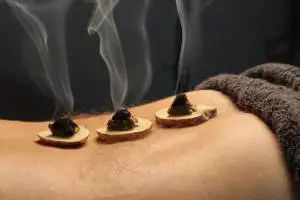
According to TCM theory, emphysema is considered to be caused by Lung deficiency, which can lead to “fei zhang,” distension of the lungs, and/or “chuan zheng,” which means “panting.” TCM can help COPD in several ways: by clearing lung congestion and opening the bronchial airways, helping to boost immune function so that a person can better avoid infections, and providing more nutrient-rich blood flow to the whole body.
One study found that COPD patients who were given acupuncture treatment had improved breathing when doing a six minute walk.
A systematic review comparing TCM treatment and convention treatment for COPD showed that acupuncture, acupressure massage, and moxibustion were all effective interventions and concluded that TCM works well as a complementary medicine/adjunct therapy for COPD.
Many Chinese herbs and herbal formulations are useful for helping to dissolve phlegm and reduce inflammation of lung tissues. TCM herbal preparations can help reduce phlegm and clear heat, relieve inflammation of airways and improve lung function.
Nutrition is also very important for patients with emphysema, who may suffer weight loss due to lack of proper nutrients in the bloodstream. An acupuncture practitioner will work with each individual to determine what kind of food program will help to reduce inflammation and provide adequate nourishment for the organ systems.
Acupuncture Near Me for Emphysema COPD in Los Angeles
TCM is a good way to help people breathe easier, whether they are suffering from allergies, asthma, pneumonia, Cystic Fibrosis, the common cold or a sore throat, or COPDs like bronchitis and emphysema. If you or someone one you love needs to quit smoking, or has been exposed to chemical pollution through their work, acupuncture can help to detoxify and strengthen the lungs.
*This article is for education from the perspective of Traditional Chinese Medicine only. The education provided by this article is not approved by FDA to diagnose, prevent, treat and cure human diseases. It should not stop you from consulting with your physician for your medical conditions. Traditional Chinese Medicine is based on Qi, which is an invisible force that usually cannot be observed by modern science. Because science focuses on testing ideas about the natural world with evidence obtained through observation, these aspects of acupuncture can’t be studied by science. Therefore acupuncture and Chinese herbs are often not supported by double-blind, randomized trials, and they are considered alternative medicine therapies in the United States.
How to Treat Myasthenia Gravis With Acupuncture and TCM
By Qineng Tan, L.Ac., Ph.D. & Xiaomei Cai, L.Ac., Ph.D.

Muscle weakness around the eyes, drooping eyelids (ptosis), double vision, blurred vision (diplopia), impaired speech? These are potential signs of Myasthenia Gravis, an autoimmune disorder that affects the voluntary neuromuscular system, especially around the eyes, mouth, and throat, and the limbs. Acupuncture and TCM offer an adjunct treatment for Myasthenia Gravis symptoms.
As with some other autoimmune diseases, Myasthenia Gravis causes antibodies produced by the body’s own immune system to attack healthy cells instead of pathogens. In the case of Myasthenia Gravis, the immune cells attack receptors on certain groups of muscles, which blocks chemicals required to stimulate voluntary muscular contractions.
A person can develop Myasthenia Gravis at any age, but the disorder is twice as prevalent among women between 20 and 40. Myasthenia is a chronic condition that cannot be completely cured. However, the symptoms can often be controlled with medications and/or other types of treatment for myasthenia gravis.
Many people with Myasthenia Gravis are able to improve their muscular strength with the right combination of treatments and maintain their normal activities. Acupuncture and other TCM modalities can be used as an adjunct therapy to improve quality of life and keep functionality strong, helping to control this autoimmune disorder.
What Causes Myasthenia Gravis?
Our voluntary muscular movements rely on the ability of our muscles to receive communications through the nervous system. There are various neurotransmitters that interact with receptors on the muscles and the proteins that make up the chemical connections between nerves and muscles. Some people with Myasthenia Gravis seem to have antibodies that are damaging or destroying these key receptors and/or proteins. Other people with Myasthenia Gravis, however, do not show unusual antibody activity (seronegative myasthenia gravis or antibody-negative myasthenia gravis), but doctors believe they must still be experiencing some form of autoimmune dysfunction affecting the nerves and muscles.
The thymus gland plays a part in immune function and is believed to play a role in the production of these antibodies that block receptors. Some people with Myasthenia Gravis had an enlarged thymus gland, or a tumor or tumors on the thymus gland.
In rare cases, a baby may be born with a form of congenital Myasthenia gravis; this is called congenital myasthenic syndrome.
People with Myasthenia Gravis may also have problems with their thyroid gland, and may be more likely to show signs of other autoimmune disorders, like rheumatoid arthritis, or lupus.
Symptoms of Myasthenia Gravis

More than half of people who end up discovering that they have Myasthenia Gravis first present with eye problems, such as double vision, blurry vision, or droopy eyelids. But the signs can also show up in the throat, with trouble swallowing, or in the mouth area, with trouble forming words, chewing food, or even breathing.
Signs of myasthenia gravis include:
- Weakness of the muscles around the eyes (ocular myasthenia)
- Drooping eyelids (ptosis)
- Double vision or blurred vision (diplopia)
- Speech problems, impaired speech (dysarthria), trouble pronouncing words
- Shortness of breath
- Change in facial expressions
- Muscular weakness in the neck, arms, hands, or legs
- Difficulty holding up the head, neck problems
- Fatigue, especially muscle fatigue
Symptoms of Myasthenia Gravis often seem to abate in the early part of the day, after a night’s rest, and then worse as the day goes on, and a person has been more active. In other words, the muscle weakness tends to improve with rest, and get worse with exertion.
Like some other autoimmune disorders, Myasthenia Gravis symptoms can come and go, sometimes flaring up and at other times going into remission. Some issues that can exacerbate symptoms might be:
- Infection or illness
- stress
- Fatigue, overwork, not enough sleep
- Surgery
- Menstrual period
- Pregnancy
- Certain medications, including some antibiotics, anesthetics, or beta blockers
The most serious form of Myasthenia Gravis occurs if the muscles that control the breathing apparatus become so weak and fatigued that a person cannot breathe; this is a medical emergency called a “myasthenia crisis,” and requires immediate medical intervention.
Myasthenia Gravis Treatment
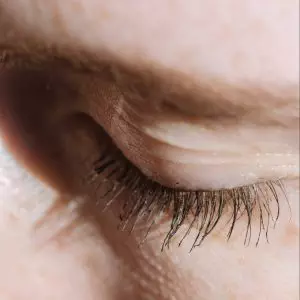
It can be a difficult process being definitely diagnosed with Myasthenia Gravis. Problems with balance, coordination, reflexes, and muscle strength may show up in a neurological exam, but they do not prove definitively what is going on. When the eyelids are drooping, doctors will often perform a test where they ice the area for two minutes to see if this improves the problem. A blood test may show a higher than normal level of antibodies of the type that affect the muscle receptors or proteins. A CT or MRI may reveal a tumor on the thymus.
Other conditions that may appear similar to Myasthenia Gravis include ALS and botulism.
Doctors will prescribe different medications to treat Myasthenia Gravis, either alone, or in combination, depending on the severity and type of symptoms. Corticosteroids and immunosuppressants can reduce the production of antibodies. Plasmapheresis can remove some of the overload of antibodies already in the system. Intravenous immunoglobulin introduces healthy antibodies that can cancel out the malfunctioning ones. Cholinesterase inhibitors can help boost the communication between the nervous system and the muscles. Unfortunately, all of these medications can come with side effects.
Surgical removal of the thymus gland if there is a tumor, or even in some cases when there is no tumor but the gland is believed to be a contributing factor, may help relieve the condition.
Acupuncture and TCM, when used as an adjunct, can help alleviate symptoms of the disorder itself, and help mitigate the side effects of other treatments.
Can TCM Herbs and Acupuncture Help Myasthenia Gravis?
Myasthenia Gravis causes miscommunications between the nervous system and the muscles. Acupuncture treatment can be beneficial for many different types of neurological, musculoskeletal, and autoimmune disorders because it has a positive impact on the communications between the various systems of the body.
TCM treatment with an experienced acupuncturist can be very helpful for patients with Myasthenia Gravis, as we take all aspects of your health into consideration while also focusing on the symptoms related specifically to this autoimmune condition. For example, acupuncture can help with sleep, feelings of anxiety and depression, problems with appetite and digestion, as well as with the muscular weakness associated with Myasthenia Gravis.
One study tested the effects of acupuncture treatment on ocular myasthenia, or eye-related symptoms. Over 90% of the patients treated experience significant improvement in their symptoms.
Chinese herb preparations used in addition to Western conventional medicines can help patients with Myasthenia Gravis. A study compared two groups of patients: one treated with corticosteroids (Prednisone), and one treated with both Prednisone and Chinese herbs. After three months, the patients given herbs showed more improvement, and were able to reduce the amount of corticosteroids needed.
A review of several studies done in China of acupuncture treatment used as complementary treatment for Myasthenia Gravis concluded that patients who had acupuncture reported better clinical outcomes than people who only received the standard pharmaceutical treatments.
While it may be challenging, it is good to include physical activity and even muscular strength training, as it is possible for patients to help overcome muscle weakness with regular exercise. Your TCM practitioner can help you follow an appropriate nutrition and movement program.
Acupuncture Near Me for Myasthenia Gravis in West Los Angeles
TCM is well-suited to help patients who suffer from both autoimmune disorders and neurological and muscular problems of all kinds because it works on multiple levels to help quiet pain signals while boosting communication signals between the different systems of the body. Dr. Tan and Dr. Cai have over 30 years of experience helping people recover from chronic illnesses like Myasthenia Gravis.
*This article is for education from the perspective of Traditional Chinese Medicine only. The education provided by this article is not approved by FDA to diagnose, prevent, treat and cure human diseases. It should not stop you from consulting with your physician for your medical conditions. Traditional Chinese Medicine is based on Qi, which is an invisible force that usually cannot be observed by modern science. Because science focuses on testing ideas about the natural world with evidence obtained through observation, these aspects of acupuncture can’t be studied by science. Therefore acupuncture and Chinese herbs are often not supported by double-blind, randomized trials, and they are considered alternative medicine therapies in the United States.
How to Treat a Sore Throat With Acupuncture and TCM
By Qineng Tan, L.Ac., Ph.D. & Xiaomei Cai, L.Ac., Ph.D.

Scratchy throat? Dry throat? Painful Swallowing? A sore throat is often the first sign of a cold, but it can be hard to tell if a swollen throat is caused by a throat infection, a virus, bacterial infections like strep throat, allergies, or something else. Acupuncture and TCM Chinese herbs can provide excellent sore throat remedies to bring quick pain relief.
Throat pain, throat irritation, or trouble swallowing due to soreness is known as “pharyngitis.” The most common sore throat causes are viral infections, or cold and flu. This type of sore throat will usually go away once the infection runs its course.
The bacterial infection known commonly as “strep throat,” caused by streptococcus bacteria (throat strep), is another common cause of sore throat, usually accompanied by fever, swollen tonsils and lymph nodes, and red spots in the mouth.
But there are many possible causes of a sore throat, including:
- Common Cold – along with a runny nose, sneezing, and cough, a sore throat is one of the common cold symptoms.
- Flu – a sore throat with fever and chills or body aches may be a sign of flu.
- COVID-19 virus – many people are experiencing a sore throat as one of the early symptoms of the latest variant. This scratchy throat can last a long time.
- Mononucleosis – the Epstein Barr virus, also known as “mono,” can cause a sore throat, swollen lymph nodes, fatigue, and sometimes a skin rash.
- Chickenpox or measles – these illnesses often start off with a mild fever and sore throat; then, the rash or skin sores appear a few days later.
- Allergies – an allergy to pollen or other particles in the air may cause dryness in the throat. Postnasal drip can also create more irritation from constant throat-clearing.
- Dryness – when the weather is very dry—as it is here in California, sometimes—a stuffy nose during the night can lead to sleeping with your mouth open. Breathing dry air through your mouth can cause you to wake up with a sore, scratchy throat.
- Vocal strain – shouting and screaming at a concert, or overusing your voice with talking or singing can lead to throat pain and the need for vocal rest.
- GERD – Acid reflux can damage the tissues of the throat, causing difficulty swallowing, a hoarse-sounding voice, and chronic pharyngitis.
- Sleep Apnea – snoring can cause a dry mouth and sore throat.
Sore Throat Treatment
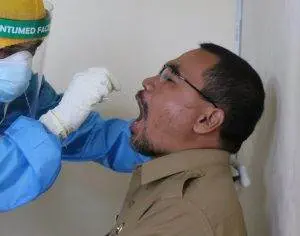
A doctor will typically perform a swab test or throat culture to check if a person has strep throat or a staph infection. If so, antibiotics are usually prescribed to treat the bacterial infection. But antibiotics will not help a sore throat that is due to a viral infection. Most people will take pain relievers or sore throat medicine to help relieve throat pain, or suck on throat lozenges.
People who suffer from burning chest pain and sore throat from GERD will often use over-the-counter antacid tablets to help with scratchy throat.
Most people just wait out a sore throat, hoping it will get better within a few days and not turn into chronic pharyngitis. Acupuncture and other TCM treatments can help reduce the time it takes to get over a sore throat and related illness.
Can Acupuncture Help a Sore Throat?

TCM methods have been used to treat upper respiratory infections, or the common cold, for thousands of years. According to TCM theory, “heat” is a pathogenic force that encompasses conditions of too much heat and dryness in the body. This excess heat can come from both external factors and internal factors. There may be a yin deficiency, meaning that there is not enough yin energy to cool down the body.
People are more prone to developing heat imbalances during the winter months because they tend to spend more time indoors with the heat on, eat more warm foods, and get less exercise. Too much heat builds up in the body, and this leads to inflammation, dryness, and sometimes itchy skin and rashes.
Acupuncture treatment can help reduce inflammation and provide analgesic pain relief of a sore throat. One study showed that people treated with auricular acupuncture for sore throat reported less pain, both 15 minutes after treatment, and six hours later. Acupuncture can also work to help clear heat from the organ systems of the body, clear phlegm from the lungs and upper respiratory tract, and to strengthen the Wei Qi, or defensive Qi.
Chinese herbs will also be instrumental in helping to clear up a sore throat. There are many varieties of herbal formulae that work in different synergistic ways to alleviate a sore throat, depending on the other related symptoms and whether or not there is some type of infection present. An acupuncture practitioner will be able to customize a formula for each individual patient, but there are many tried-and-true Chinese herb preparations that work well for colds and sore throats in many cases.

Yin-Qiao, an herbal formulation composed of several Chinese herbs, is a very popular remedy for the common cold and works very well to shorten the duration of a cold, especially if taken right at the first sign of a sore throat. Yin-Qiao has been shown to work on many levels, as an antiviral, anti-bacterial, and an anti-inflammatory, as well as helping to strengthen immunity.
A sore throat is a sign that you should rest your voice, get extra sleep, and consume plenty of liquids. We recommend sipping on warm water, on its own or with lemon or ginger, or an herbal tea such as mint. Eat more cooling foods, such as: apples, pears, especially Asian pears, radishes, cucumbers. These will help dispel heat.
Acupuncture for Sore Throat Near Me in West Los Angeles
While often a sore throat is simply a symptom of a mild cold, it is also a clear signal that there is some kind of infection or other imbalance present. It is wise to pay attention and do everything you can to boost your immune system as soon as you notice that scratchy throat sensation. An acupuncture treatment and herbs can go a long way towards helping make sure that a sore throat doesn’t turn into something more serious.
*This article is for education from the perspective of Traditional Chinese Medicine only. The education provided by this article is not approved by FDA to diagnose, prevent, treat and cure human diseases. It should not stop you from consulting with your physician for your medical conditions. Traditional Chinese Medicine is based on Qi, which is an invisible force that usually cannot be observed by modern science. Because science focuses on testing ideas about the natural world with evidence obtained through observation, these aspects of acupuncture can’t be studied by science. Therefore acupuncture and Chinese herbs are often not supported by double-blind, randomized trials, and they are considered alternative medicine therapies in the United States.


